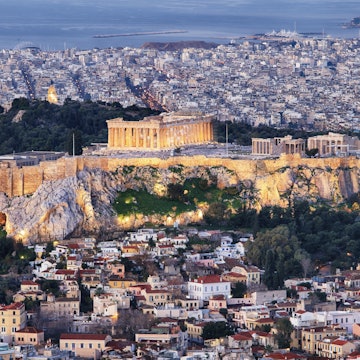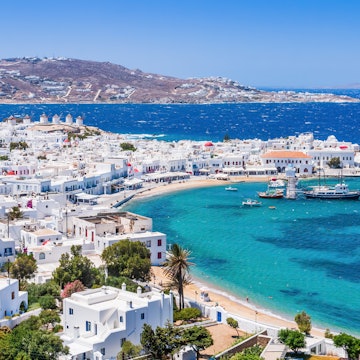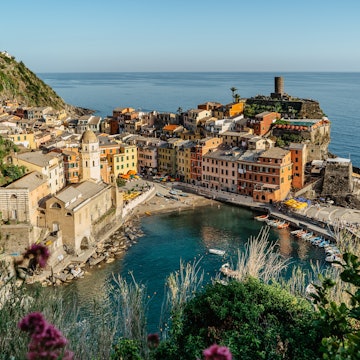

Explore Athens in great weather. Nejdet Duzen/Shutterstock
Greece is famed for its crystalline seas, ancient attractions, and warm hospitality.
Summer is when most travelers choose to explore its countless islands, while spring and fall are the best times to marvel at the myriad archeological sites dotted around the country.
Winter can be cool and occasionally rainy. But for those conscious about budget or interested in seeing how the locals live, the vibrant capital of Athens still delivers history, culture, and good times in spades, even when the sunshine starts to fade.
Whether you’re dreaming of the southeast Mediterranean nation’s dreamy beaches, ancient allure, or buzzing city life, these are the best times to visit Greece.

May to October is best for island-hopping
Orthodox Easter, Greece’s most significant spiritual holiday, lands in April or May and unofficially starts the island-hopping season. In the final month of spring, the seas are just starting to lose their winter chill and are still too cool for swimming, at least by local standards. In May, the average daily high is a warm 77°F and days are normally sunny.
Keep in mind that the deep cobalt waters of the Aegean, in the north and south, take longer to warm up than the shallower, turquoise seas of the Ionian, west of mainland Greece. The warm weather season is longer - at least on land - the further south you sail through the Aegean archipelago. Islands such as Rhodes and Crete are ideal for a sunny shoulder season getaway in May, September, or October when beaches are empty of schoolkids (with the exception of UK mid-term holidays).
June affords the longest days of sunshine, peaking in the second fortnight. It’s also an opportune time for your first, refreshing dip of the summer. July and August are the busiest months of the year on the islands, so expect high airfares, peak season hotel rates, crowded beach bars, bustling main towns, and packed restaurants in popular destinations like Mykonos, Santorini, and Paros, among others. Southern Europeans, including Greeks retreating to their second homes, gravitate toward the islands at this time of year.
July and August are also the hottest and driest months in Greece, with average temperatures often exceeding 86°F, and there is the potential for stifling heatwaves. Thankfully, the Meltemi, a welcome north wind that makes its appearance mostly between June and September, tempers the heat. Still, if you’re intent on visiting during July and August, be sure to book at least six months in advance to secure slightly better airfares and hotel rates.
By September, Greece’s seas have thoroughly warmed through and school holidays are over, meaning that you’ll have more room to yourself at that idyllic beach and a peaceful night’s sleep. Airfares and hotel rates are also more affordable. As a result, it’s now one of the most popular months of travel for those who want to enjoy a more relaxing island or mainland holiday.
By about mid-October, Greece’s seas start to pick up swell, and air temperatures begin to fall, while the majority of hotels stay open until the end of the month. It’s still an excellent time of year to visit, as long as you come prepared with warmer clothing for cooler evenings.

See the ancient sites in spring or fall
From the Vergina Royal Tombs Museum dating to the times of Alexander the Great in Macedonia to the Minoan-era Palace of Knossos in Crete, ancient marvels and historical monuments liberally dot the landscape wherever you journey throughout Greece. Stonebuilt temples, palaces, and castles act like a magnet for sunlight, so the best times of the year to plan your history geek-out are March, April, or October. The weather is comfortably cool and the crowds are noticeably thinner. As a bonus, you can expect to pay less for flights and accommodation.
Layers of clothing, such as short-sleeve shirts and a light fleece jacket, are vital to ward off the chill but also to peel off as you hike between ruins and landmarks. Pack a water-resistant jacket and hiking shoes because showers are a real possibility, while March also brings occasional snowfall in mountainous mainland areas such as Central Greece.
Scratch below the surface of Greece’s archaic attractions and museums by booking a small group or private tour, led by a state-licensed guide. Rather than wander around the sacred ancient temples of Delphi on your own, seek an expert, many of whom are also qualified archeologists or historians. It’s not just about the specific details they impart but the fascinating anecdotes you would never find in a history book. The best guides are usually booked up in the height of summer, so take advantage of their availability and deep knowledge by scheduling a visit in March, October, or November.

Fall and winter are the best times to experience Athens like a local
Greeks, the majority of whom live in Athens, return to base no later than October to resume their normal routines. But that doesn’t mean the city goes quiet.
You’ll still be able to sit outdoors at cafes and restaurants and soak up the insouciant vibes of city life. At the same time, the queues to visit the Acropolis and other ancient sites around town disappear, the Monastiraki flea market is quieter, and it’s easier to snag a table at a rooftop restaurant for dinner with views of an illuminated Parthenon.
And November and December, with the exception of the Christmas and New Year period, offer some of the most tempting airfare and hotel deals. Between November 1 and March 30, entrance fees at ancient sites and state-run museums, like the treasure-filled National Archaeological Museum, are significantly reduced, making a December vacation a more appealing option for families on a budget.
Temperatures are still comfortably warm in November, with average highs of around 65°F. In December, the mean temperature drops to about 58.46°F, and average monthly rainfall hovers around 65mm. As winter takes hold, Athenian night owls congregate indoors at bars and clubs in inner-city Gazi, Keramikos, and Metaxourgio, where they listen to alt-rock bands, notable jazz artists on tour, and electronic music.
Best of all, Athens regains its true identity. Whether you’re walking the cobblestoned streets of old town Plaka on a Sunday afternoon, checking out the bookshops in the intellectual Exarhia neighborhood or even scaling the verdant heights of Lycabettus Hill (the city’s best vantage point for views of the capital’s vast urban sprawl) you’ll find yourself among locals going about their day-to-day lives. Most Greeks, particularly younger generations, will take every opportunity to dust off their English skills, so don’t be shy about striking up a conversation and asking for insider tips.
















